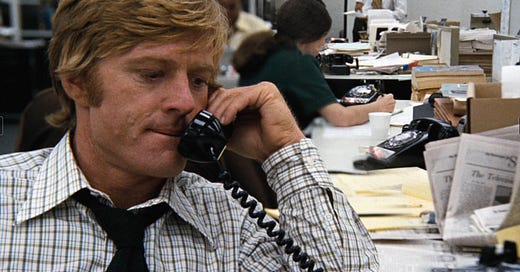All the President's Men (1976)
Directed by Alan J. Pakula
The 1973 hearings of the Senate Watergate Committee, as it was known, took place almost every weekday through the late spring and summer, digging into the revelations of Nixon administration crimes and cover-ups uncovered by the media. The hearings were broadcast live on PBS television (this was before C-SPAN) and re-run in the evening. The pointed questions by senators and the often fumbling answers by Nixon administration officials were so dramatic that millions watched for hours (This might be thought of as the mid-70s equivalent of binge-watching), gathering a broad knowledge of the affair.
I can't claim that every teenager watched the hearings, but I did. To me, the investigation of Nixon, leading to his resignation in August 1974, was a cherished commuppance, not just of Nixon and his cronies but of adults in general. I could tell you who H.R. Haldeman and Archibald Cox and Charles Colson were, what the Saturday Night Massacre was, and why Margaret Mitchell, the wife of Attorney General John Mitchell, was a key to the scandal.
I cheered every scandalous revelation, every resignation from the White House, every felony conviction. When Nixon resigned, I watched his speech on TV with my parents, who had voted for him twice. None of us said a thing. Nixon's resignation itself had spoken for me, and his attempt to ameliorate his action, by claiming that he no longer had support in Congress and thus wouldn't be able to pass any more legilation, spoke for my parents. Of course, Nixon didn't resign because he had lost support in Congress -- except that in this case "lost support" meant that he would have been shortly impeached and certainly convicted. He left because the public, having read about his deeds in the paper and seen them investigated on TV, knew everything he had done, and he would be impeached if he didn't go first.
I didn't rub it in; I didn't have to. The world was renewed, and in three weeks I would go off to college in Austin, 200 miles and a world away from the ghastly suburb of Houston I had lived in. The victory over Nixon and what he stood for was a foretaste of the liberation I was about to experience.
(Forty years later, Trump made Nixon look like Lincoln. While it's good to see Trump beginning to reap what he sowed -- I'm writing this a day after he was indicted for trying to overturn the 2020 election -- the feeling is different from Watergate. Trump survived two impeachments, including one for doing what he's just been indicted for, because Congress is now riddled with supporters who care less about the Constitution and the country than they do about their inclusion in Trump's cult. I'm sure that if we'd had this kind of cult politics in 1973, Nixon would have survived.)
So I never read "All the President's Men," the book in which Washington Post reporters Bob Woodward and Carl Bernstein told the story of their multi-year investigation into the illegal activities of the Nixon administration in 1972-75. I didn't feel the need to; I had seen a different perspective, that of television. But I sure saw the resulting film, released barely 18 months after the book, which itself was published even before Nixon resigned.
Directed by Alan J. Pakula, the film lends considerable glamor to the tale of the investigation in the persons of Robert Redford and Dustin Hoffman (Woodward and Berstein, respectively) and Jason Robards, who plays Post editor Ben Bradlee. But my favorite people in the film are Martin Balsam, who plays the Managing Editor, and Jack Warden, who plays the Metro Editor. (The Metro section was the original home of the Watergate burglary story.) These long-time supporting actors, who appeared together in the 1957 film version of "12 Angry Men," almost convince the viewer that the managers at the Washington Post were cigar-chewing, subway-riding city-dwellers who wouldn't be out of place in the bleachers at a Yankees game or sweating out an August day on the beach at Coney Island. They bicker with other characters and laugh raucously at jokes during the budget meeting, while simultaneously upholding the standards of day-to-day journalism. They know reporting requires phone calls and shoe leather and copious notes and two sources for every fact. The movie, in fact, is an short course in basic reporting.
On this viewing, I was struck by the film's sense of restraint. Music plays only a small role. Contrary to the almost patriotic feeling the film inspires in many viewers, the music is moody, a little mysterious, as befits an investigation. And there are no fistfights or car chases, no direct confrontations with the villains; the closest we get is Bernstein calling Attorney General John Mitchell on the phone -- we hear Mitchell's voice (voiced by John Randolph) growling and threatening -- asking for a reaction quote. The reporters here and in almost every scene keep their emotions subdued. They aren't portrayed heroically, but as people doing a day's work.
This portrayal fit with the 1970s belief, as celebrated in the classic sociological landmark by Studs Terkel, "Working," that everyday jobs had dignity, that workers in every industry and every level were worthy of both curiosity and respect. (Of course, that was when CEO pay was only 20 times the average salary, not 351 times as in 2020.) Only at the film's end, when Jason Robards gives his little speech about how "nothing much is hanging on this, only the First Amendment and freedom of the press," is the day-to-day struggle of reporters to get the story elevated to something truly noble, something liberating.




